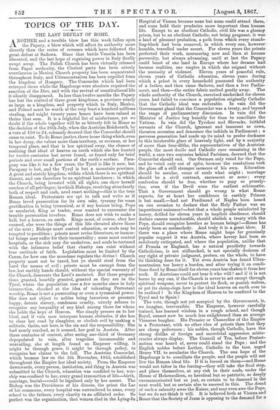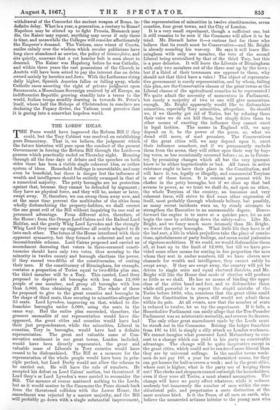TOPICS OF THE DAY.
THE LAST DEFEAT OF ROHE.
NOTHEB and a terrible blow has this week fallen upon 11. the Papacy, a blow which will affect its authority more directly than the series of reverses which have followed the great defeat at Sadowa. Since that battle Venetia has been liberated, and the last hope of regaining power in Italy finally swept away. The Polish Church has been virtually released from Papal authority, the Clerical party has been utterly overthrown in Mexico, Church property has been sequestrated throughout Italy, and Ultramontanism has been expelled from the kingdom of Hungary. The Concordat which had been octroyed there while the Hapsburgs were absolute required the sanction of the Diet, and with the revival of constitutional life it silently disappeared. In less than twelve months the Papacy has lost the control of three great kingdoms, a province nearly as large as a kingdom, and property which in Italy, Mexico, and Poland must be worth at the very least a hundred millions sterling, and might twenty years hence have been valued at thrice that sum. It is a frightful list of misfortunes, yet we doubt if the whole together will be so bitterly felt in Rome as the decision of the 26th July, when the Austrian Reichsrath, by a vote of 130 to 24, solemnly decreed that the Concordat should cease to exist. To do Rome justice, there is one thing which, even in her decay, she values more than territory, or revenue, or her temporal place, and that is her spiritual sway, the chance of realizing that ideal of heaven on earth which she has hunted for twelve centuries but never found, or found only for brief periods and over small portions of the earth's surface. Para- guay was like it for a few years, the Tyrol is like it now, but Paraguay is lost, and the Tyrol is but a mountain province. A great and stately kingdom, within which there is no spiritual dissent, and can therefore be no spiritual harshness ; in which the Church, being invested with all rights, can show herself careless of all privileges; in which Bishops, receiving abundantly both of respect and cash, need exact nothing—this is the true Roman ideal. Protestants are apt to talk and write as if Rome loved persecution for its own sake, tyranny for some gratification in being tyrannical, as if any human being, Pope or secularist, King or trader, ever wanted to encounter the trouble persecution involves. Rome does not wish to make a hell, but a heaven, on earth. Kings must, of course, obey her counsel, else were the things of this life elevated above those of the next ; Bishops must control education, or souls may be tempted to perdition ; priests must revise literature, or immor- tal beings may suffer for their immortality ; nuns must control hospitals, or the sick may die unshriven, and souls be tortured with the infamous belief that charity can exist without true rectitude of faith. Legislation must be limited by the Canon, for how can the mundane regulate the divine ? Church property must not be taxed, lest ye should steal from the Lord the means of evil ; priests must be exempt from the law, lest earthly hands should, without the special warranty of the Church, desecrate the Lord's anointed. But these proposi- tions granted, heartily granted, granted as they are in the Tyrol, where the population rose a few months since in holy insurrection, shocked at the idea of tolerating Protestant worship, Rome is not a persecuting or even a tyrannical power. She does not object to nobles being luxurious or peasants happy, detests slavery, condemns cruelty, utterly refuses to recognize any inequality of any kind among those for whom she holds the keys of Heaven. She simply presses on to her ideal, and if vain men interpose human obstacles, if she has to clear her road by slaughter, or abolish evil by making a solitude, theirs, not hers, is the sin and the responsibility. She had nearly reached, as it seemed, her goal in Austria. After three centuries of contest, after seeing one-third of Germany depopulated in vain, after tragedies innumerable and unavailing, she at length found an Emperor willing, it might be through grace, it might be through policy, to recognize her claims to the full. The Austrian Concordat, which became law on the 5th November, 1855, established throughout the Empire her ideal society. From the Emperor downwards, every person, institution, and thing in Austria was submitted to the Church, education was confided to her, wor- ship was confined to her, every grand transaction of life—birth, marriage, burial—could be legalized only by her assent. The Bishop was the Providence of his diocese, the priest the Lar of his commune, every hospital was surrendered to nuns, every school to the fathers, every charity to an affiliated order. So perfect was the organization, that women died in the Lying-In Hospital of Vienna because none but nuns could attend them, and nuns held their pruderies more important than human life. Except to an obedient Catholic, civil life was a gloomy prison, but to an obedient Catholic, not being pregnant, it was a land of pleasant probation, a path from which every stumb- ling-block had been removed, in which every one, however humble, travelled under escort. For eleven years the priests- perfected their work, murmuring now and then at human' perversity, but always advancing, until at last the Papacy- could boast of one land in Europe where her dreams ha& become realities, one empire in which she reigned without- the necessity of violence'. Eleven years of peaceful rule, eleven years of Catholic education, eleven years during which a priest in every household possessed the authority of a father, and then came Sadowa, and then a free Peale,- ment, and then—the entire fabric melted gently away. The whole authority of the Church, exercised unchecked for eleven years, had failed to convince a population originally Catholic- that the Catholic ideal was endurable. In vain did the Government plead that the Concordat was a treaty, and beyond the range of parliamentary discussion. In vain did the- Minister of Justice beg humbly for time to conciliate the Vatican. In vain did the Tyrolese and Slovacks, faithful servants of the Church, ignorant and innocent as cows,. threaten secession and denounce the infidels in Parliament ; a:. perverse generation had made up its mind to prefer darkness to this intolerable glare of heavenly light, and by n majority of more than four-fifths, the representatives of the Austrian people, the most docile and Catholic race remaining in the a race two centuries behind Parisians, decreed that the. Concordat should end. One German only voted for the Pope, and he voted only out of spite, because the resolutions took the gloss off a still stronger measure of his own. Education- should be secular, come of souls what might ; marriage. should be a civil contract, sacrament or none ; every confession should be free, whether to pray or prosely- tize, even if the Devil were the earliest schismatic. That a Government should go wrong is what Rome- expects, for at heart her confidence in earthly Princes is but small—had not Ferdinand of Naples been heard on one occasion to declare that the Holy Father was an impertinent nuisance ?—but that a whole people uninfected by heresy, drilled for eleven years in implicit obedience, should declare canons unendurable, should abolish a treaty with the Pope, should recognize heretics as human beings !—Rome has. rarelybeen so melancholy. And truly it is a great blow. If there was a place where Rome might hope for genuinely popular support it was Austria, where heresy had been so- sedulously extirpated, and where the population, unlike that of Prussia or England, has a natural proclivity towards Catholicism, is not stiffnecked, is not specially desirous of any right of private judgment, prefers, on the whole, to have its thinking done for it. Yet even Austria has found Ultra- montanism too heavy a burden, and after trying it on condi- tions fixed by Rome itself for eleven years has shaken it from her neck. If Austrians could not bear it who will ? and if it is not borne by any one, if the Church is never to act except through spiritual weapons, never to protect its flock, or punish wolves,. or pet its sheep-dogs, how is the ideal heaven on earth ever to. be realized ? Is the Kingdom of Heaven to be confined to the Tyrol and to Spain ? The vote, though not yet accepted by the Government, is,. we imagine, irreversible. The Emperor, however carefully trained, has learned wisdom in a rough school, and though Royal, cannot now be much less enlightened than an average Viennese burgher. His Premier or Chancellor of the Empire is a Protestant, with no other idea of priests than that they are cheap policemen ; his nobles, though Catholic, have the strong dislike of foreign and sacerdotal aggression aristo- cracies always display. The Council of Ten, before Protest- antism was heard of, never could stand the Pope ; and the English nobles before Luther, Catholic to the toes, urged Henry VII. to secularize the Church. The one hope of the Hapsburgs is to conciliate the people, and the people will not live the Roman ideal life. If it is forced on them—and Rome would not falter in the forcing—they will take the final step, and place themselves, at any risk to their souls, under the House of Hohenzollern, so heretical but so patriotic, so deeply excommunicated but so just, so certain to be damned in the next world, but so certain also to succeed in this. The dread of such a calamity awes the Kaiser, and may even awe the Pope, but we do not think it will. It is believed both at Vienna and Rome that the Society of Jesus is opposing to the demand for a withdrawal of the Concordat the ancient weapon of Rome, in- definite delay. What is a year, a generation, a century to Rome? Napoleon may be stirred up to fight Prussia, Bismarck may die, the Kaiser may repent, anything may occur if only there is time, and meanwhile the Colleges will consider affectionately the Emperor's demand. The Vatican, once wisest of Courts, smiles calmly over the wisdom which secular politicians have long since abandoned as unwise, the policy of laissez-faire, and Sits quietly, unaware that a yet heavier bolt is soon about to descend. The Kaiser was Hapsburg before he was Catholic, and within three years the vast possessions of the Church in Austria will have been seized to pay the interest due on debts owned mainly by heretics and Jews. With the Lutherans rising daily higher, Spanish America fallen or falling away, whole Catholic races asserting the right of private judgment upon Sacraments, a Mussulman Sovereign received by all Europe, an indifferentist Republic growing steadily into a terror to the world, Italian troops steadily drawing in towards St. Peter's itself, where half the Bishops of Christendom in conclave are declaring the Papacy divine, the Vatican must perceive that it is gazing into a somewhat hopeless world.































 Previous page
Previous page